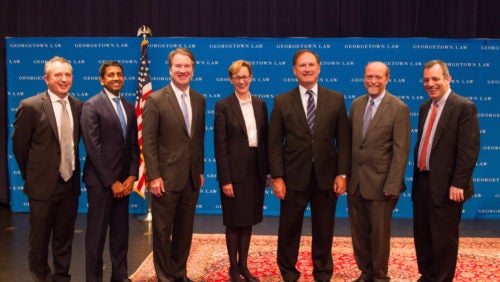Justice Samuel Alito, U.S. Court of Appeals Judges Explore International Law at GLJ Symposium
November 7, 2017

Pictured left to right: Judge David Barron, Judge Sri Srinivasan, Judge Brett Kavanaugh, Judge Debra Livingston, Justice Samuel Alito, Georgetown Law Dean William Treanor and Harvard Law Dean John Manning in Hart Auditorium on November 2. Judge David Barron, Judge Sri Srinivasan Judge Brett Kavanaugh, Judge Debra Livingston, Justice Samuel Alito, Georgetown Law Dean William Treanor and Harvard Law Dean John Manning in Hart Auditorium on November 2.
Most Georgetown Law students serving on journals try to outdo their predecessors when it comes to planning a symposium — inviting the most prominent speakers they can find. And then there’s the 2017-2018 staff of the Georgetown Law Journal.
Headed by Editor in Chief Jennifer Ong and Symposium Editor Lauren Wands, the Volume 106 GLJ staff invited Supreme Court Justice Samuel Alito, four other federal appellate judges and Harvard Law Dean John Manning to Georgetown Law on November 2 to explore the role of international law in the U.S. legal system. And that was just the first panel.
Alito and Manning, acting as moderator, joined Judge David Barron of the U.S. Court of Appeals for the First Circuit, Judge Debra Livingston of the Second Circuit, Judge Brett Kavanaugh of the D.C. Circuit and Judge Sri Srinivasan of the D.C. Circuit in Hart Auditorium.
The judges explored the role of customary international law under the Constitution and in U.S. courts in light of the framework presented in Professor Bradford Clark and Professor A.J. Bellia’s book The Law of Nations and the United States Constitution. Customary international law — for example, the principle that children should not be soldiers — results from the general and consistent practice of states (nations) followed out of a sense of legal obligation.
Alito noted that customary international law issues arise on the Second Circuit and the D.C. Circuit — cases involving Guantanamo and the military — more than on the Third Circuit, where he once served.
“When an issue of customary international law comes up, it’s very likely to come up before a judge who has little if any prior experience in the subject, and therefore it’s very important for those judges to have access to materials that can give them a quick course so they can get up to speed,” Alito said. “This is one of the many ways in which the book I think can make a major contribution, whether you agree with the analysis or not.”
And fortunately for the GLJ, the judges agreed that academic scholarship is invaluable when grappling with issues of customary international law.
“I dig into the legal scholarship on the particular issue that’s in front of me…” Kavanaugh said. “I rely heavily, on my Guantanamo cases, on [Georgetown Law Professor] Marty Lederman and David Barron’s articles in the Harvard Law Review…it’s very valuable, because people spend months or years thinking about a problem that we might have engaged weeks to focus intensely on.”
Pathbreaking
The discussion explored multiple sides to the debate, including the “modern” position claiming that judges should treat all customary international law as federal law, and a “revisionist” position claiming that courts should not apply customary international law unless it is adopted by the political branches as federal law or by the states as state law. It also examined the way the law of nations interacts with the U.S. Constitution.
“[This is] a signal event, not only for the Law Center, but for constitutional discourse…,” said Georgetown Law Dean William M. Treanor, who introduced the symposium. Subsequent panels on November 3, he noted, would explore the law of nations as it relates to federal courts, federal common law and historical context. Professor from Practice David Stewart and Professor Lederman were among the moderators.
“We’ve brought together a remarkable group of scholars who are both specialists in customary international law, as well as federal courts, constitutional history and structure, and foreign relations,” the dean said.
Editor in Chief Ong said the lineup of panelists was the culmination of nearly a year’s worth of work.
“We worked very closely with Professors Clark and Bellia, and we were very fortunate that the judges and scholars were willing to take part in this event,” she said. “I think their willingness to participate in a symposium on customary international law shows the importance of the issue and the groundbreaking framework that the professors put forth in their book. We’re looking forward to seeing the conversation expand to other scholars in the field and continue in the future.”